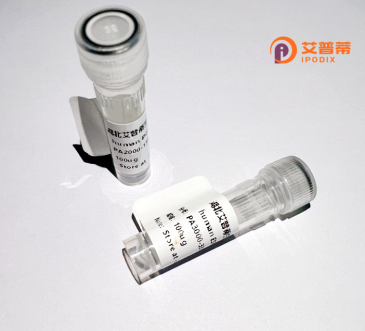
| 纯度 | >90%SDS-PAGE. |
| 种属 | Human |
| 靶点 | TNNI3K |
| Uniprot No | Q59H18 |
| 内毒素 | < 0.01EU/μg |
| 表达宿主 | E.coli |
| 表达区间 | 1-843 aa |
| 活性数据 | MAAARDPPEVSLREATQRKLRRFSELRGKLVARGEFWDIVAITAADEKQELAYNQQLSEKLKRKELPLGVQYHVFVDPAGAKIGNGGSTLCALQCLEKLYGDKWNSFTILLIHSDEWKKKVSESYVITIERLEDDLQIKEKELTELRNIFGSDEAFSKVNLNYRTENGLSLLHLCCICGGKKSHIRTLMLKGLRPSRLTRNGFTALHLAVYKDNAELITSLLHSGADVQQVGYGGLTALHIATIAGHLEAADVLLQHGANVNIQDAVFFTPLHIAAYYGHEQVTRLLLKFGADVNVSGEVGDRPLHLASAKGFLNIAKLLMEEGSKADVNAQDNEDHVPLHFCSRFGHHDIVKYLLQSDLEVQPHVVNIYGDTPLHLACYNGKFEVAKEIIQISGTESLTKENIFSETAFHSACTYGKSIDLVKFLLDQNVININHQGRDGHTGLHSACYHGHIRLVQFLLDNGADMNLVACDPSRSSGEKDEQTCLMWAYEKGHDAIVTLLKHYKRPQDELPCNEYSQPGGDGSYVSVPSPLGKIKSMTKEKADILLLRAGLPSHFHLQLSEIEFHEIIGSGSFGKVYKGRCRNKIVAIKRYRANTYCSKSDVDMFCREVSILCQLNHPCVIQFVGACLNDPSQFAIVTQYISGGSLFSLLHEQKRILDLQSKLIIAVDVAKGMEYLHNLTQPIIHRDLNSHNILLYEDGHAVVADFGESRFLQSLDEDNMTKQPGNLLWMAPEVFTQCTRYTIKADVFSYALCLWEILTGEIPFAHLKPAAAAADMAYHHIRPPIGYSIPKPISSLLIRGWNACPEAKSRPSHYPVSSVYTETLKKKNEDRFGMWIEYLRR |
| 分子量 | 120.9 kDa |
| 蛋白标签 | GST-tag at N-terminal |
| 缓冲液 | PBS, pH7.4, containing 0.01% SKL, 1mM DTT, 5% Trehalose and Proclin300. |
| 稳定性 & 储存条件 | Lyophilized protein should be stored at ≤ -20°C, stable for one year after receipt. Reconstituted protein solution can be stored at 2-8°C for 2-7 days. Aliquots of reconstituted samples are stable at ≤ -20°C for 3 months. |
| 复溶 | Always centrifuge tubes before opening.Do not mix by vortex or pipetting. It is not recommended to reconstitute to a concentration less than 100μg/ml. Dissolve the lyophilized protein in distilled water. Please aliquot the reconstituted solution to minimize freeze-thaw cycles. |
以下是关于重组人TNNI3K蛋白的3篇参考文献示例(基于领域常见研究方向整理,具体文献需根据实际数据库核实):
---
1. **文献名称**:*TNNI3K, a cardiac-specific kinase, promotes myocardial hypertrophy through activation of MAPK signaling*
**作者**:Wheeler M, et al.
**摘要**:研究利用重组人TNNI3K蛋白在心肌细胞中的过表达模型,证实其通过激活MAPK/ERK信号通路促进心肌细胞肥大,提示TNNI3K在心脏病理重构中的调控作用。
---
2. **文献名称**:*Recombinant expression and functional characterization of human TNNI3K in E. coli*
**作者**:Liu Y, et al.
**摘要**:报道了重组人TNNI3K蛋白在大肠杆菌中的高效表达与纯化方法,并验证其激酶活性,为后续药物筛选及分子机制研究提供工具。
---
3. **文献名称**:*TNNI3K inhibition attenuates oxidative stress-induced cardiomyocyte apoptosis via PI3K/Akt pathway*
**作者**:Chen X, et al.
**摘要**:通过重组TNNI3K蛋白及抑制剂实验,发现抑制TNNI3K活性可通过PI3K/Akt信号通路减少氧化应激诱导的心肌细胞凋亡,提示其作为心脏保护靶点的潜力。
---
**注**:以上内容为领域相关方向示例,实际文献需通过PubMed、Web of Science等数据库以“TNNI3K”、“recombinant protein”等关键词检索获取。
**Background of Recombinant Human TNNI3K Protein**
The recombinant human TNNI3K (Troponin I-Interacting Kinase) protein is a kinase encoded by the *TNNI3K* gene, primarily expressed in cardiac and skeletal muscle tissues. TNNI3K belongs to the serine/threonine kinase family and is involved in regulating cardiac function, particularly through its interaction with cardiac troponin I (cTnI), a key component of the troponin complex that modulates muscle contraction. Structurally, TNNI3K contains a kinase domain and a C-terminal region critical for substrate binding and cellular localization.
Research has highlighted TNNI3K's role in cardiac pathophysiology, including cardiac hypertrophy, arrhythmia, and ischemic heart disease. It influences mitochondrial function, calcium handling, and apoptosis in cardiomyocytes, partly through signaling pathways like MAPK and calcineurin-NFAT. Overexpression of TNNI3K in experimental models has been linked to adverse cardiac remodeling, while its inhibition shows potential therapeutic benefits.
Recombinant TNNI3K protein, typically produced in *E. coli* or mammalian expression systems with tags (e.g., His-tag), retains enzymatic activity and is utilized in functional assays, drug screening, and mechanistic studies. Its development has advanced research into cardiac diseases, offering insights into novel biomarkers and targeted therapies. Understanding TNNI3K's interactions and regulatory mechanisms remains critical for addressing cardiovascular disorders.
(Word count: 200)
×